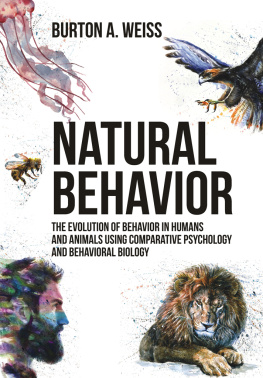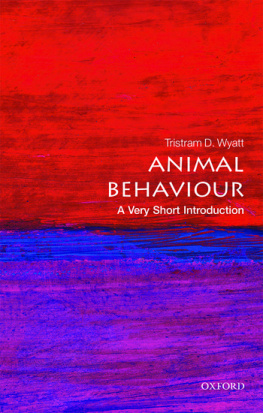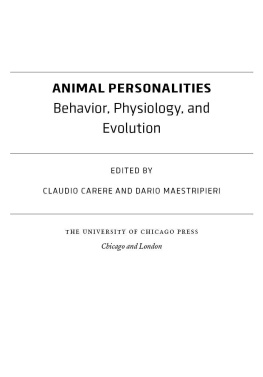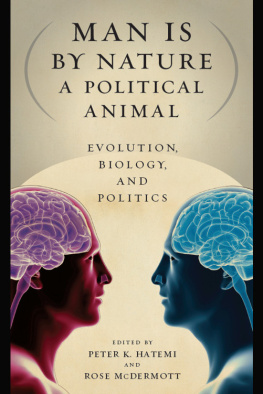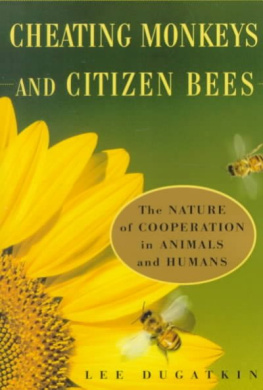
NATURAL BEHAVIOR
NATURAL BEHAVIOR
The Evolution of Behavior in Humans and Animals Using Comparative Psychology and Behavioral Biology
Burton A. Weiss, Ph.D.
Professor Emeritus, Drexel University
Adjunct Professor Emeritus, University of the Arts

Natural Behavior: The Evolution of Behavior in Humans and Animals Using Comparative Psychology and Behavioral Biology
Copyright 2018 Burton A. Weiss.
All rights reserved. No part of this publication may be reproduced, distributed, or transmitted in any form or by any means, including photocopying, recording, or other electronic or mechanical methods, without the prior written permission of the publisher, except in the case of brief quotations embodied in critical reviews and certain other noncommercial uses permitted by copyright law.
Universal Publishers, Inc.
Irvine Boca Raton
USA 2018
www.universal-publishers.com
ISBN 978-1-62734-242-1 (pbk.)
ISBN 978-1-61233-141-6 (ebk.)
Typeset by Medlar Publishing Solutions Pvt Ltd, India
Cover design by Ivan Popov
Publishers Cataloging-in-Publication Data
Names: Weiss, Burton A., author.
Title: Natural behavior : the evolution of behavior in humans and animals using comparative psychology and behavioral biology / Burton A. Weiss.
Description: Irvine, CA : Universal Publishers, 2018. | Includes bibliographical references and index.
Identifiers: LCCN 2017962734 | ISBN 978-1-62734-242-1 (pbk.) | ISBN 978-1-61233-141-6 (ebook)
Subjects: LCSH: Human behavior. | Human evolution. | Animal behavior--Evolution. | Hominids--Evolution. | Psychology, Comparative. | BISAC: PSYCHOLOGY / Animal & Comparative Psychology. | SCIENCE / Life Sciences / Evolution.
Classification: LCC BF671 .W45 2018 (print) | LCC BF671 (ebook) | DDC 156--dc23.
This book is dedicated to
E. G. Wever
and
T. C. Schneirla,
two mentors and giants of comparative study.
Contents
CHAPTER 1
The Subject of Nature
CHAPTER 2
Nature as the Subject
CHAPTER 3
Nature in Humans
CHAPTER 4
Humans in Nature
Preface
T he intent of this book is to present a concise history of scientific thought and the topic of evolution along with the understanding of the evolution of behavior from single cell organisms to humans with many original ideas. The ideas come from many decades of university teaching, research, and study.
Any attempt to cover such a large span of life must be a selective survey of example phyla and species because the field is immense. Any one species could occupy an entire career of study. Hopefully, this book will interest readers to pursue the topic of the evolution of behavior and specific species more intensively.
In acknowledgement, I want to thank my wife, Ruth A. Weiss, for her encouragement and enablement in the creation of this book. I also want to thank William J. Cook, Delaney Johnson, and Joseph Selm, for their assistance and advice.
To conclude, I am offering some of my animal poetry.
| Rabbits | Ants |
| Rabbits have habits | Ants have pants |
| of hopping around | that no one has seen |
| my well tended ground, | because they are not keen |
| while mirthfully devouring | to wrestle with the glitches |
| everything flowering. | of fitting six legs into britches. |
CHAPTER 1
The Subject of Nature
The Trend Away from the Egocentric View
Throughout the history of human thought, especially in Western civilization, there has been a clear trend. That trend has been away from human egocentrism, the tendency to view humanitys position in the world as primary. The trend has been led by science.
A review of the highlights of the trend could begin with the ancient Greek, Aristotle (384322 B.C.E.), who organized the Universe with the Earth at the center and the celestial bodies revolving around it. The terrestrial world was divided into ranks ordered by degrees of perfection. The ranks placed people superior to animals and animals above plants. Each level had specific characteristics. Thus, people were rational while animals were instinctive.
About 250 B.C.E. Aristarchos of Samos proposed the heliocentric concept of the Universe with the Earth revolving around the Sun. Although, the heliocentric view was adopted by some astronomers like Seleukos of Seleukia, Aristotles geocentric version prevailed and was preeminent into ancient Rome. After the end of the Roman Empire, Aristotles work was lost to European knowledge. However, the civilizations of North Africa retained Aristotles ideas, which were especially promulgated by the astronomer, Ptolemy of Alexandria, in the second century C.E. Ptolemy developed a geometric model of Aristotles view of the central Earth and the Sun, Moon, Planets, and Stars revolving about the Earth in circular orbits. The model was cumbersome, but allowed calculation of planetary positions. Maimonides (Moses ben Maimon, 11351204 C.E.) incorporated Aristotelian ideas into Hebrew theology and from there they spread into Islamic doctrine. In the middle 1200s C.E. Ibn Daud translated Hebrew, Greek, and Arabic science, philosophy, and theology into Latin. The Latin translations returned the geocentric ideas of Aristotle to European civilizations, which were emerging from the dark ages. Aquinas (12251274 C.E.) read Maimonides and brought the thinking of Aristotle into Christian theology. He converted the linear levels into a system topped by absolute perfection, God. The next level was occupied by beings still too perfect to commit sin, angels. The following level held rational organisms, people. In the fourth level were instinctive creatures, animals. Finally, at the bottom of the order is vegetative life, plants. Modern Hebrew, Islamic, and Christian theology retain the image of rational people separate from instinctive animals.
However, Aristotelian geocentric views were questioned when Hasdai Crescas (13401410 C.E.) employed logic to refute them. Copernicus (Nikolai Kopernik, 14731543 C.E.) postulated and Galileo (15641642 C.E.) proved that the Earth was not the center of the universe or even the solar system, but actually orbited the sun. These discoveries, now elemental, were vehemently attacked. They were a challenge to the egocentric view of humanity as the center of the universe that had been incorporated into theology. Copernicus, fearful of persecution, hid his papers for posthumous publication. Bruno (15481600 C.E.) studied Copernican principles and unwisely espoused these ideas in public, for which act he was burned. Galileo was tried in Italy for heresy, forced to recant, and incarcerated for life in 1633 C.E. He was forbidden from writing further and all of his works were burned. But, Galileos ideas had already spread beyond Italy.
So strongly held was the egocentric position that even seemingly remote challenges were met with severe sanctions. Thus, Servetus (Miguel Serveto, 15111553 C.E.) was burned by John Calvin for describing blood circulation as being pumped by the heart. The prevailing view was that blood ebbed and flowed like the tides as Aristotle had stated. People of the era thought the heart was the seat of the soul and conceived of health and personality as based on the balance of body fluids. We still retain many heart references for emotions. Two centuries later, Benjamin Franklin was also widely condemned by clergy for investigating such heavenly phenomena as lightning. That reaction to scientific exploration influenced the separation of church and state clause in the American Constitution, which Franklin helped compose. The framers of the Constitution were determined to prevent clergy from destroying people for having new ideas. Yet, the myth of devout founding fathers is still promulgated despite contrary evidence. For example, Washington opened his successful attack on Trenton and subsequently Princeton on Christmas. Had Washington been devout and not launched his campaign on Christmas, he would not have had the element of surprise necessary to defeat the better armed and trained opposition. Thus, the Colonies would have remained British. Washington would not likely have been surprised by an attack on Sunday morning like that at Pearl Harbor.
Next page
